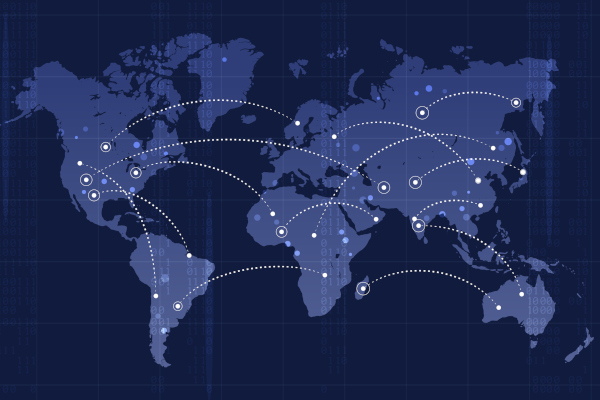In today’s increasingly interconnected global economy, organizations across all industries are finding themselves more dependent than ever on vast digital networks of third-party partners, vendors, and collaborators. These complex digital supply chains often span multiple countries and continents, facilitated by ever-evolving technologies. While offering invaluable flexibility and cost efficiencies, this new paradigm also necessitates the sharing of proprietary data and sensitive content across an exponentially growing array of digital channels and platforms.
A striking revelation from the 2023 Kiteworks survey of Fortune 2000 companies shows that a full 90% are now exchanging sensitive content with over 1,000 external entities on a regular basis. Furthermore, the diversity of tools and methods leveraged for content sharing is also rising sharply, with a majority of companies now utilizing six or more different digital channels and platforms, ranging from email and file transfers to custom APIs and mobile apps.
This dramatic expansion of the digital supply chain, while filled with potential, also introduces daunting challenges for security, compliance, and governance. The sheer complexity of managing content sharing across such a myriad of external touchpoints represents an enormous logistical challenge in and of itself. More crucially, it also massively increases vulnerabilities and the potential attack surface area for catastrophic security breaches or data leaks.
Each new digital channel or API introduced into an organization’s technology ecosystem exponentially increases the risks, making it profoundly difficult to maintain consistent governance, security, compliance, and risk management across the board. The quickly evolving threat landscape compounds these challenges even further with cybercriminal groups continuously innovating more advanced, stealthy, and automated attacks specifically targeting vulnerabilities introduced by digital supply chain complexity.
For global companies, the situation is further complicated by the complex and often fragmented regulatory environment surrounding cross-border data flows and privacy. Organizations frequently find themselves facing a maze of compliance requirements around how data can be stored, processed, or transferred across national jurisdictions. Research by Kiteworks shows that even mid-sized companies are now forced to dedicate over 300 staff hours annually just to ensure compliance for sensitive content communications across their digital supply chain and ecosystem.
To cope with these rising challenges surrounding security, governance, and compliance, organizations must make robust cybersecurity practices and controls a top strategic priority across their digital supply chains. Contrary to frequently being viewed as outdated or restrictive, practices such as stringent access controls, data encryption, and software patch management represent deeply foundational building blocks.
When woven together, these form a critical bedrock for constructing secure and resilient environments to safely navigate the turbulence of such rapidly evolving digital ecosystems. For instance, comprehensive data encryption strategies ensure sensitive information remains protected at every step as it travels between countless servers, devices, and applications across the interconnected digital supply chain.
Likewise, hardened access controls and privileged access management provide safeguards against unauthorized exposure in the event of a breach. Consistent implementation of software patches closes vulnerable holes that cybercriminals aggressively scan for.
On top of this critical foundation, organizations must layer on more advanced cybersecurity controls and business processes to manage risk across a shifting digital supply chain landscape. Network micro-segmentation and zero-trust architectures that tightly control access and movement between digital environments help contain damage in the aftermath of breaches. Likewise, multi-layered security models avoid single points of failure.
During tumultuous events like mergers, acquisitions, or divestitures, proactively protecting and securing critical digital assets prevents unauthorized access or data leaks as systems and contracts get severed, transferred, or decommissioned. Likewise, ensuring a robust capacity to detect, respond, and recover from incidents is crucial for resilience.
With threat actors and the regulatory landscape evolving faster than ever, organizations must build agility into their cyber strategies rather than relying solely on static defenses. Integrating advanced technologies like artificial intelligence, machine learning, and automation allows much tighter real-time monitoring for anomalies and threats across complex digital supply chains.
Likewise, attack simulations, cyber wargaming, and purple team exercises prepare incident response teams. Fostering cultures of security empowers employees to serve as an invaluable human layer of protection to complement technological measures.
The convergence of cyber resilience practices, risk management programs, and compliance processes serve as the crucial recipe for securing sensitive data across the modern digital supply chains underpinning business. As interconnected networks continue expanding globally, so too must executive commitment to the resources, tools and processes required for managing risks, avoiding disruptions, and maintaining trust with sensitive data in motion.
About the Author

Tim Freestone, the chief marketing officer at Kiteworks, is a senior leader with more than 17 years of expertise in marketing leadership, brand strategy, and process and organizational optimization. Since joining Kiteworks in 2021, he has played a pivotal role in shaping the global landscape of content governance, compliance, and protection. He can be reached at [email protected].
SC
MR


Latest Supply Chain News
- Few executives believe their supply chains can respond quickly to disruptions
- Technology’s role in mending supply chain fragility after recent disruptions
- Tech investments bring revenue increases, survey finds
- Survey reveals strategies for addressing supply chain, logistics labor shortages
- Israel, Ukraine aid package to increase pressure on aerospace and defense supply chains
- More News
Latest Podcast

 Explore
Explore
Business Management News
- Few executives believe their supply chains can respond quickly to disruptions
- Technology’s role in mending supply chain fragility after recent disruptions
- Survey reveals strategies for addressing supply chain, logistics labor shortages
- How CPG brands can deliver on supplier diversity promises
- How S&OP provides the answer to in-demand products
- AI, virtual reality is bringing experiential learning into the modern age
- More Business Management
Latest Business Management Resources

Subscribe

Supply Chain Management Review delivers the best industry content.

Editors’ Picks





